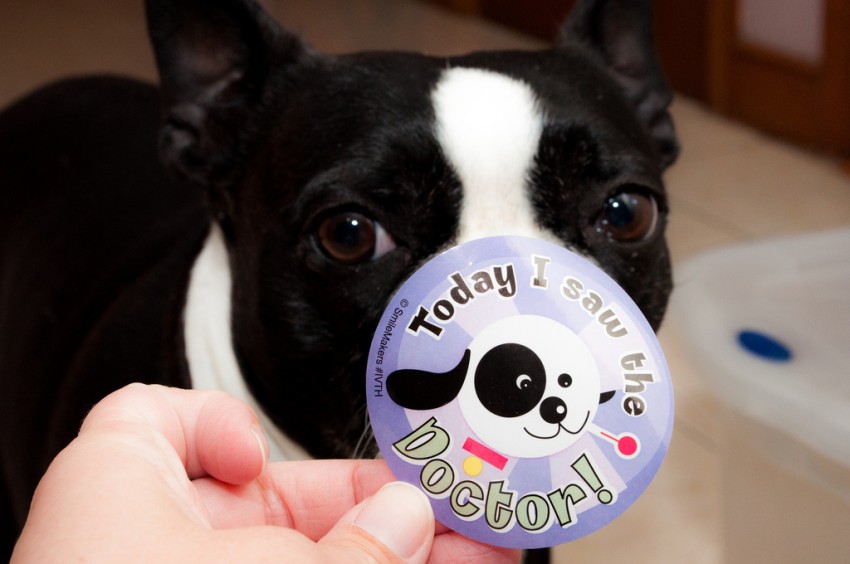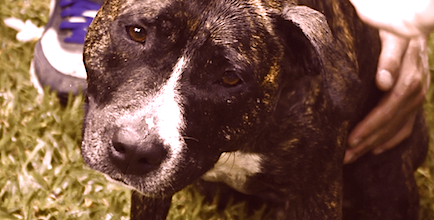What’s in Your Pet Medicine Cabinet?
Here’s some advice on sorting out expired meds and unlabeled bottles — plus, 4 common medications you should always keep on hand.

Veterinarians get a lot of emergency calls after hours. The good news is that many of the calls are not immediate emergencies but “advice” calls.
About 80 percent of the time, the pet is not in need of emergency treatment. Often I can advise the veterinary version of “Take 1 aspirin and call me in the morning” or “Take nothing and see me in the morning.”
In the “Take 1 aspirin” category, we talk about what medications they have at home that might give comfort to the pet in an urgent but not emergency situation.
If you call your veterinarian late at night, she is not looking at her computer and may not be able to recall your pet’s full medical history. Having your pet’s medications in front of you may help jog your vet’s sleepy memory.

Don’t leave your pet’s safety to chance
Sign up for Petful recall alerts today.

Older Medications
You are constantly told to dispose of unused portions of medications for yourself and your pet, right?
Do most people do this? No, they don’t.
Personally, because of the cost of many medications and because so many pets have chronic conditions, I think people should hold on to most recent medications. But call for advice before using them willy-nilly.
Notice the word “recent.” The majority of expiration dates on meds are there for a reason. Although most expired medications may not be dangerous, they may simply be useless. Have all medications in their original bottles when you call for emergency advice. It will have the date dispensed on the bottle, and your vet can help you decide if the medicine should be used or not.
- Liquid medications: As a rule, liquid meds and specially compounded meds have short shelf lives. Many people save liquid antibiotics, for example, to use later. Amoxidrops or Clavamox drops, 2 common liquid antibiotics dispensed to kitties, are examples of meds that are useless after 10 to 14 days.
- Antibiotics: Antibiotics should generally be given as prescribed. In other words, finish the prescription unless the pet had an adverse reaction to the med (another reason to dispose of it).
So many people call in to say they gave their cat, Brady, the pink stuff I prescribed a year ago. This old medicine is not going to help Brady now. Old will do nothing for deflate-gate now. (There are so many pets in New England named after our famous quarterback. In my mind, these pets’ reputations will remain untarnished.)
What about other medications you may have? Pain meds, GI or anti-diarrheal meds, or ear, skin, or eye medications prescribed previously may be of use.
Ask Before Administering Meds
Let’s go back to that late-night advice call. Say you’ve found your pet’s medications. Ask your vet before giving a previously dispensed medication, particularly if you’re not sure what it’s for.
Trust me, I get all kinds of honest admissions from clients:
- “I couldn’t remember if it was the pink pill or the green one, so I gave the green one.”
- “Fluffy died 2 years ago, but Buffy was sick just like Fluffy was. So I gave Buffy Fluffy’s medicine. That was OK, right?”
Now, if it’s 3 a.m. and the conversation begins with the caller thinking that Buffy looked a bit puffy so she gave Fluffy’s medicine to Buffy… Well, let me just say she did not have me at hello. At that hour, I might be thinking that Buffy is a bit puffy from a vampire relative named Fluffy, and that this phone call is really just a veterinary nightmare.
Ask the vet before you give any medication to your pet.
Try this: Notate on the vial why the medication was prescribed in the first place.
Keep These 4 Things in Your Medicine Cabinet
Petful offers a list of products that are helpful in many medical situations, in consultation with your vet. A few over-the-counter drugs may require a 24-hour drug-store run:
- Benadryl has few contraindications and can be given for allergic reactions or as a possible help for itching until the pet can be seen.
- Pepcid AC is generally a safe medication to give for what sounds like mild GI upset if it is after hours and the pet is not in extreme distress.
- Hydrocortisone cream can be applied to insect bites or hot spots until the pet can be seen.
- Triple antibiotic ointment can be applied to minor cuts and scrapes.
In this video, Dr. Greg Martinez, DVM, discusses allergic reactions and dosage guidelines for over-the-counter antihistamines:

All of the above advice and medications are for a 1- or 2-time use. Stop the medication either because your pet is 100% in the morning, or because you are bringing him in to see the vet in the morning.
Either way, stop using meds without a diagnosis after a very short period of time.

This pet health content was written by a veterinarian, Dr. Debora Lichtenberg, VMD. It was reviewed for accuracy by Dr. Pippa Elliott, BVMS, MRCVS, and was last updated Dec. 17, 2018.







